Monica Gallon: Fleeting moments in fabric
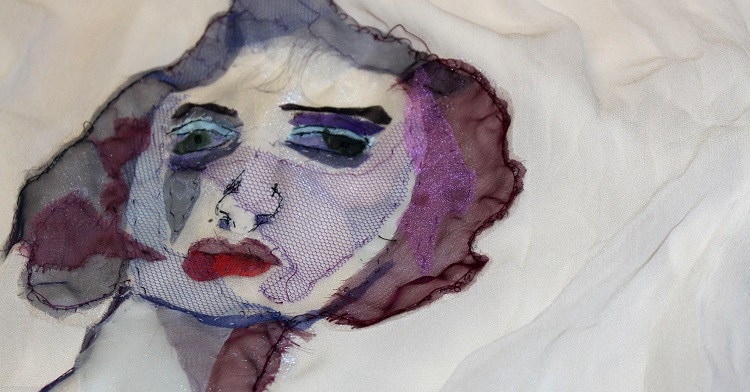
Using vintage clothing and hand-dye batik fabrics as a starting point, Monica Gallon builds up layers of snipped fabric into everyday scenes of conversation or reflection, using stitched line drawings and pieces of coloured fabric collaged in a controlled and considered way. Her work is known for capturing a glimpse of real life; a look, a moment or an interaction. Her portraits and scenes draw you in as the viewer. You begin to wonder who the subjects are and what their secrets might be. This is what makes them so magical and entrancing.
A maker since childhood, Monica’s life-long fascination for textiles drives her. Fast forward a few decades and the years of artistic practice now allow her to take more risks. She has learned to trust her own judgement.
Monica gained her Bachelor of Arts degree at the University of Gothenburg, Sweden in 1974. She also attended the Dômen Art school (1975-1978) and the University of Skövde. She worked for over two decades as a high school teacher in Art and Design and as a scenographer and costume designer in the theatre industry. She is a member of Konstnärernas Riksorganisation (the Swedish Artists’ Association), the International Association of Art, VMT (Västsvenska mönster- och textilkonstnärer, a group of Swedish pattern and textile artists) and Nordic Textile Art. Monica’s work has been exhibited throughout Sweden. In 2006 she received a scholarship from the community of Mariestad and her work from the project was shown in Mariestad’s public spaces including the library and hospital.
Join us to discover Monica’s inspirations and methods. In this interview, she shares her artistic journey, which started by delving into her grandmother’s stash of fabric to make clothes for her dolls when she was a young child. She discusses the benefits of being able to work in a tranquil environment away from the hubbub of city life and how she finds herself really staring at people, taking in the minute details and then using those day-to-day interactions and moments to inspire her work.
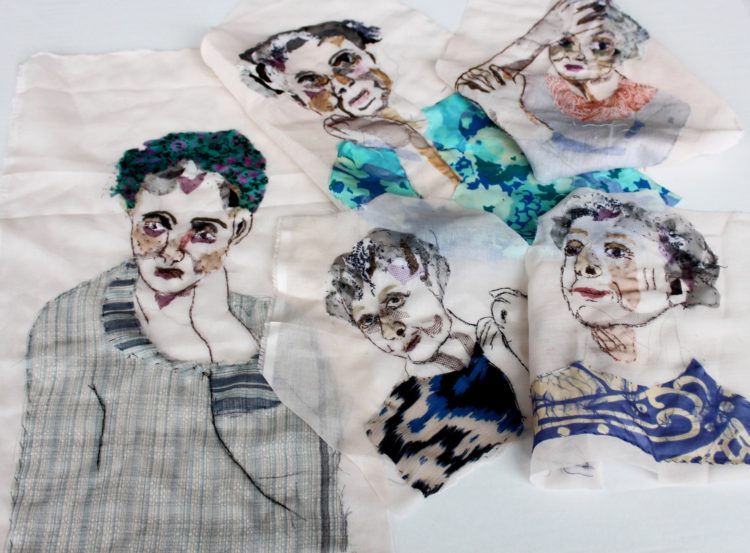
Peaceful creativity
TextileArtist.org: What initially attracted you to textiles as a medium? How was your imagination captured?
Monica Gallon: When I was a little girl I spent a lot of time with my grandmother. She was a laid back lady and I felt very free and relaxed with her. It’s not that my parents were super-strict, they always encouraged me to explore life. But my grandmother was very easy to be with. In my grandparents’ guestroom, there was a chest of drawers. It was stuffed full of fabric, buttons and ribbons. As a child, I become so fascinated. It was a heavenly treasure trove!
I could pick what I wanted and use it for my own projects, which I did. I used to sew different outfits for my Barbie dolls. I would fashion them outdoor clothing, evening gowns and bathing suits! My imagination seemed endless. I sewed historical dresses and modern ones, seeking inspiration from books and magazines. My goal in life at the time was to become a fashion designer. I used to buy foreign fashion magazines like Burda and Brigitte which included sawing patterns. As a bonus, I could practise my German and English language. Despite all this, I got low marks in handicraft at school. But you can’t win them all, right?
As I got older I started to invent wearable art, spending many happy hours cutting pieces from all kinds of materials like fabric, paper and felt. I glued them onto canvas pieces to wear. My clothes were updated with embroidery. Battery acid leaked and destroyed a denim jacket so I gave it a new life with appliqué. It was learning by doing. I made a lot of mistakes though, but it instilled an endless love of fabric in me.
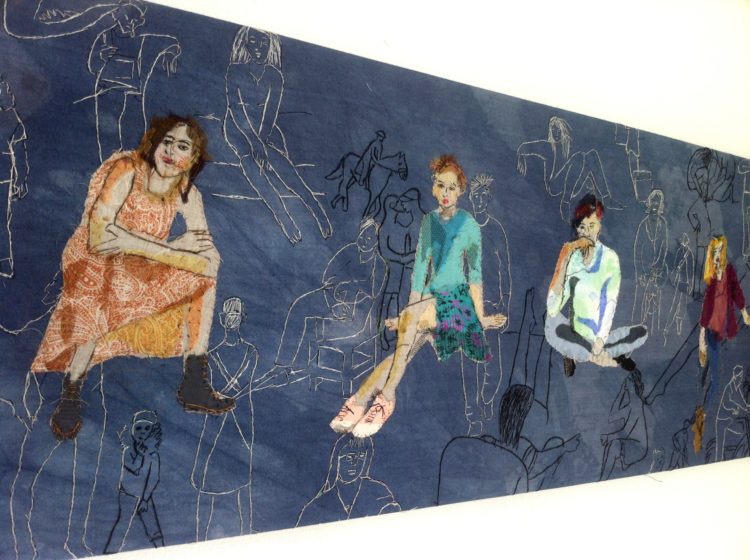
What or who were your early influences and how has your life/upbringing influenced your work?
None of my family worked in creative industries, although my mother really loved decorating. Our home was very tastefully decorated and so elegant. My father was an engineer in one of the large shipyards that dominated Gothenburg. His hobby was gardening. Looking back both of my parents had an interest in aesthetics.
My parents considered a career as an artist too uncertain and they hoped I would become a lawyer or a teacher. But ever since I was a little girl I had this urge to express myself.
The real eye-opener was my experiences in the Sixties and Seventies. Students all over the world opposed injustice, dictatorship and the Vietnam War. At the time it felt like it was a new revolution among artists. It became important to show what was going on around the world. It was also a time for female artists to take a front-row seat in the art scene. I was very taken by this movement, which had spread to every corner of the art scene. It struck me to the core. It created a sense of community, not only in Sweden but with workers and students all over the world. We thought we could make a difference and to some extent we really did.
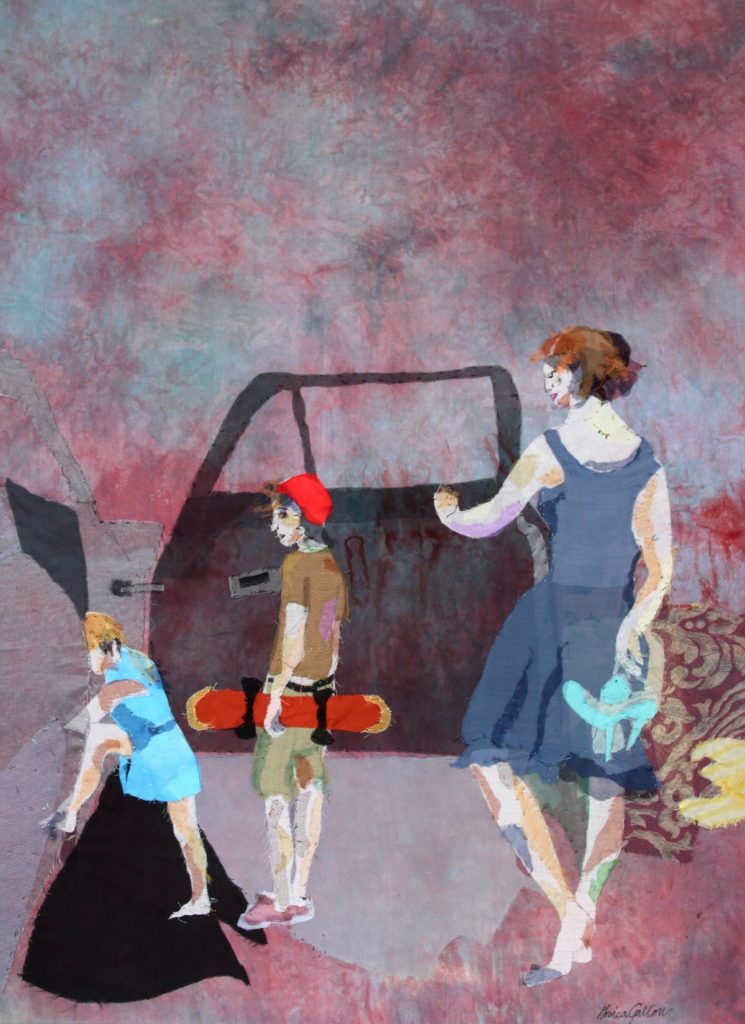
What was your route to becoming an artist?
My journey has been spent travelling a long and winding road, so to speak. In the Eighties, I took my husband, my two babies and my sewing machine and moved out to the countryside. We moved from Gothenburg to a small village in the southern part of Sweden. The stillness and tranquillity was such a blessing for my creativity. The change from the big city life to the calmness of being in the middle of nowhere, with the nature surrounding us, was therapeutic and aided my artwork.
I didn`t have to compare myself with other artists any more. I focussed on doing my own thing and letting my creativity flow. I used to dye my own fabric in the garden while the children were playing. After a while, I contacted some galleries about exhibiting. To my delight they were interested.
After a few years, we moved to another small town, Mariestad, which is situated near one of Sweden’s largest lakes. I worked with a few theatre companies. I made costumes for the actors and made scenography for children’s theatre plays. My exhibitions became more frequent and were held all around Sweden.
I also made public works of art. The largest one (at 3m x1.5m) was for the children’s section in the public library in Mariestad. The theme I wanted to explore was pollution, immigrants and animal species; and how we are all a part of this world.
After that, I tried to find new techniques that I could use. A friend came with a suitcase full of old evening dresses from the Forties and Fifties, which had belonged to her mother. There were pieces made from satin, lace, pearls, velvet and chiffon. This took me back to rummaging through my Grandmother’s fabric supplies drawer as a child. I used those beautiful pieces, giving them a new life, sewing layer over layer to create shadows, perspective and portraits.
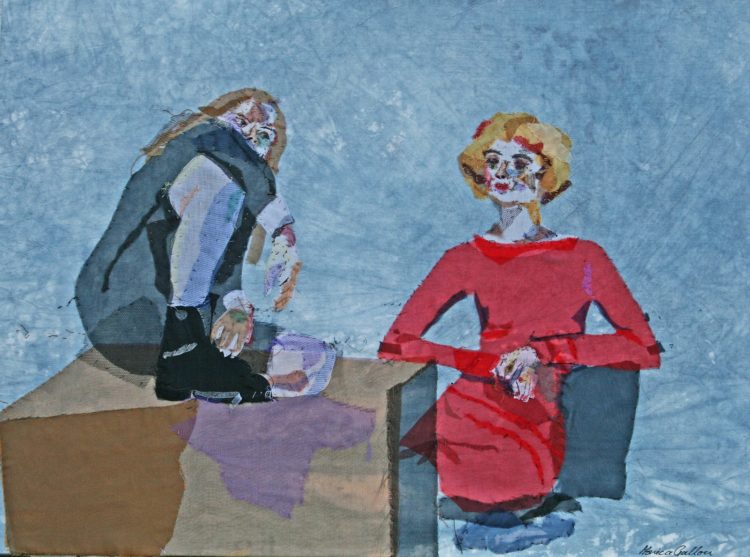
Staring at people!
Tell us about your process from conception to creation
I read a lot and I am an avid observer. I find myself really staring at people! I don’t mean to, but when I see an interesting person, object or situation I can’t look away. I commit that moment to memory so I can refer to it later on, as inspiration for a new art piece. Pictures, movies or a walk in the woods or by the water can also be inspiring.
I aim to illustrate everyday life. I sketch a lot and sometimes I use my sketches for inspiration when I’m about to start a new project. But usually, I jump in and start to cut pieces directly, especially for a portrait. It grows organically. I feel like an author without a book; through the fabric, I can tell a story. Sometimes I don’t really know where that story might end, but with the motive to begin, the story follows its own path.
In all of my artwork, I use recycled and vintage fabric. I enjoy the thought that someone’s dearest blouse or dress now has a significant place in my artwork. A shirt filled with someone’s memories lives on as an important part of my artwork.
I find it very meditative to stand and cut and pin the small pieces of fabric. People ask me often about my patience. I can find patience when I make art. Otherwise, not so much!
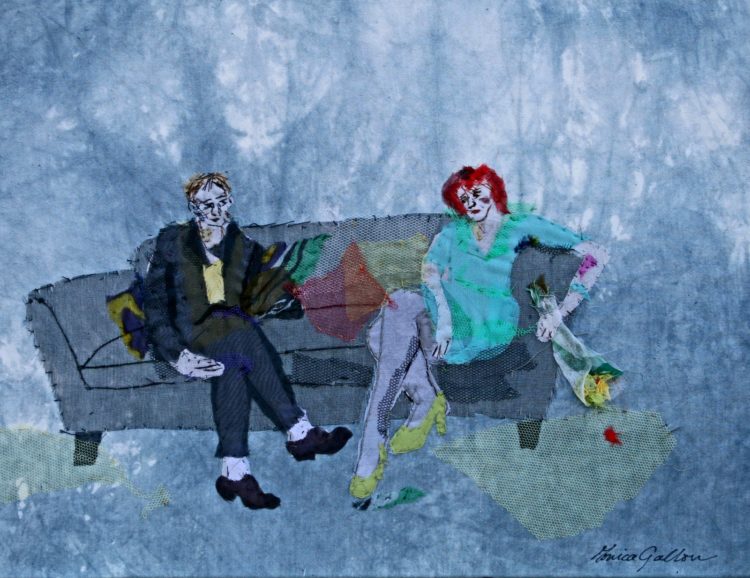
Tell us a bit about your chosen techniques and how you use them
First I choose a dye colour and prepare the background cloth. I hand-dye cotton fabric with batik. This type of colour changes in contact with the oxygen in the air, so the results can be unpredictable. I may aim for green and it can turn out yellow. But that makes every piece unique; it’s like watercolour for cloth. And I actually like to be surprised and not have absolute control of the process.
In my mind’s eye, an idea starts to form. I then select a thin, transparent fabric suitable for my needs. It is a slow and careful process. I cut small pieces and pin them on the background fabric. As the artwork grows I carefully sew the fabric snippets on by hand with silk thread.
I like to experiment, for example with non-woven cloth, the kind that is meant to protect vegetables from frost and insects. That was a positive experience.
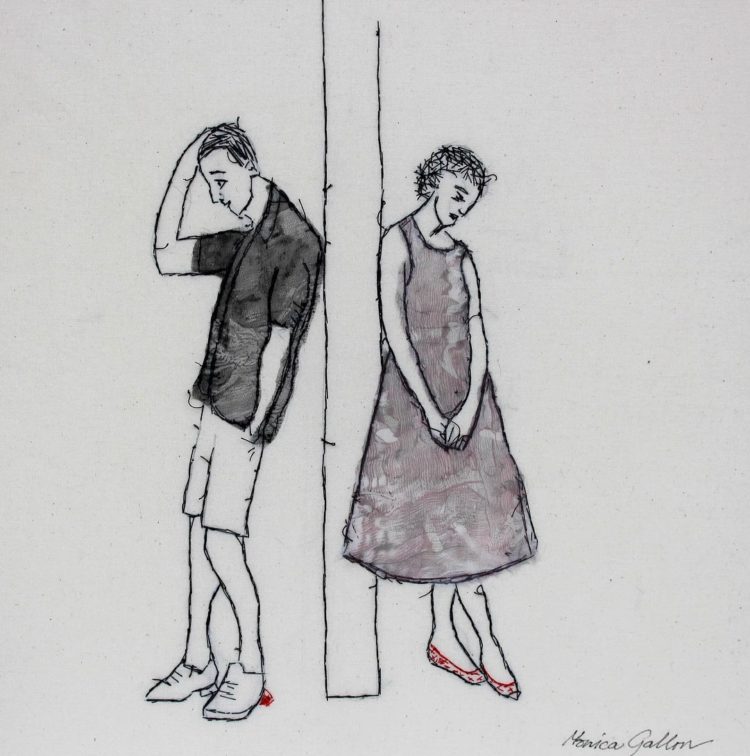
What currently inspires you?
The small moments of everyday life are still a big inspiration to me. I can sit and watch people for hours. I might notice two people meeting, perhaps observing a nervous hand gesture or the simple act of a person holding someone’s gaze.
Sometimes I can be sitting in my art studio and suddenly a memory pops into my head from years ago. With that memory burning in my head, I start to work on a new piece.
Ageing is another matter that intrigues me.
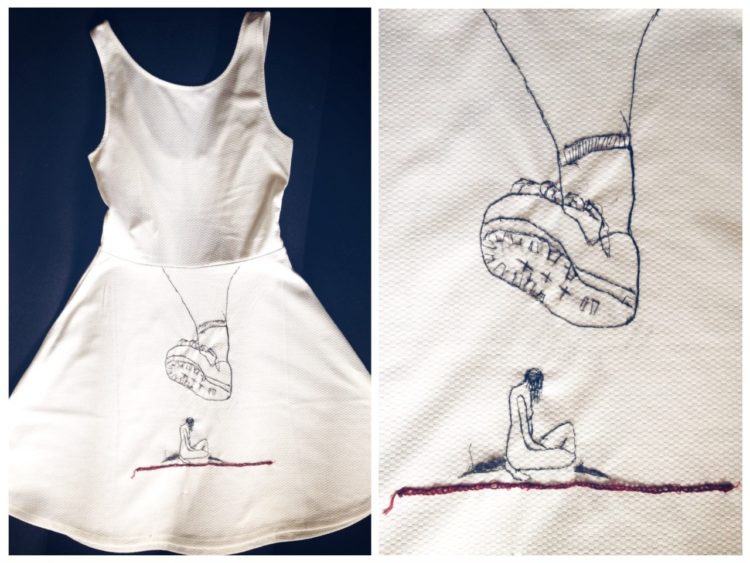
Tackling a difficult theme
Tell us about a piece of your work that holds particularly fond memories and why?
Two years ago my daughter was writing a monologue for the theatre stage. She would act in the play as well. The play was about how some elderly men use the internet for sexual grooming, how they seek contact with young children to get an opportunity to abuse them sexually.
She asked me to create an artwork that corresponded with the theme of the play, which was to be exhibited in the lobby at the theatre. I decided to use white dresses and white T-shirts to symbolize the girls and boys that could be or had been abused.
The task was difficult but fulfilling. I wanted every piece to carry a message. I used embroidery and appliqué to depict the different situations, feelings of shame, despair and hope. The audience was very moved by the theme, by my work and above all by my daughter’s acting. The play and my artwork initiated a lot of questions and dialogue among the audience. I am so glad I got that rare chance to make a difference and thank Catharina for that opportunity.
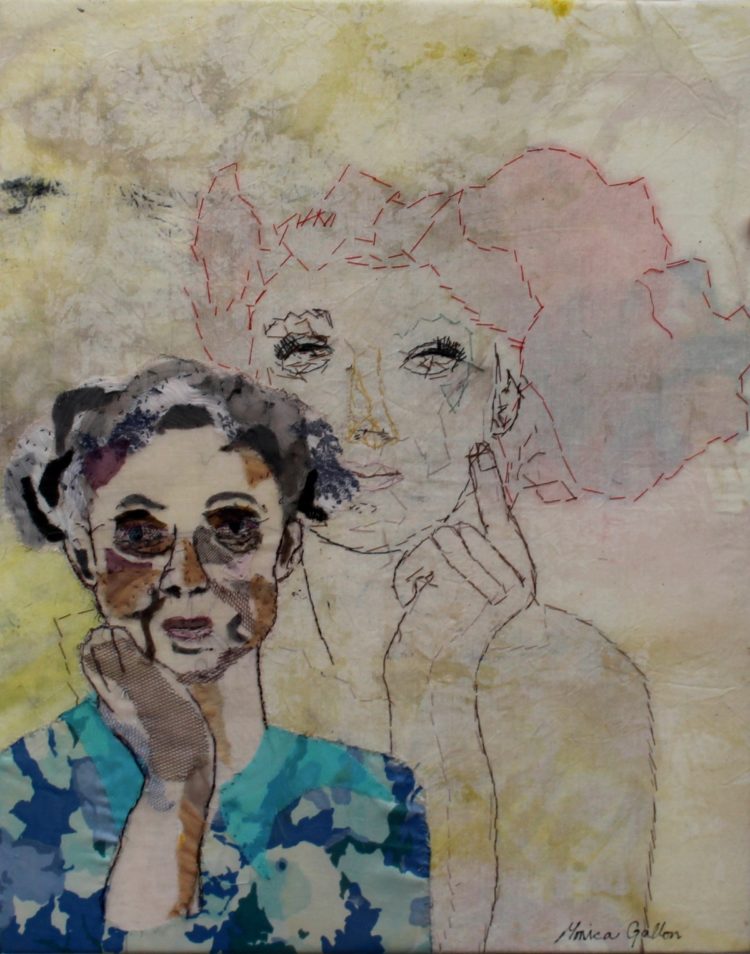
How has your work developed since you began and how do you see it evolving in the future?
I am more forgiving with myself. I can appreciate something I might have considered as a failure when I was younger. I almost see it as a blessing now.
I take more risks and allow myself to have faith in my work and process. When you work with a certain material for a long period of time, you really get to know it. It becomes a part of you, an extension of yourself. When I’m out looking for new fabrics in vintage stores for an example, I can see from a distance what fabric could work and which ones won’t.
I’m fascinated by all types of fabric and textiles and I’m still driven by a curiosity to find new ways to challenge myself.
It has always been important to me to have a conversation through my artwork. I continue to try and capture moments of life; hopefully creating that special dialogue between myself, my art and those who experience it.
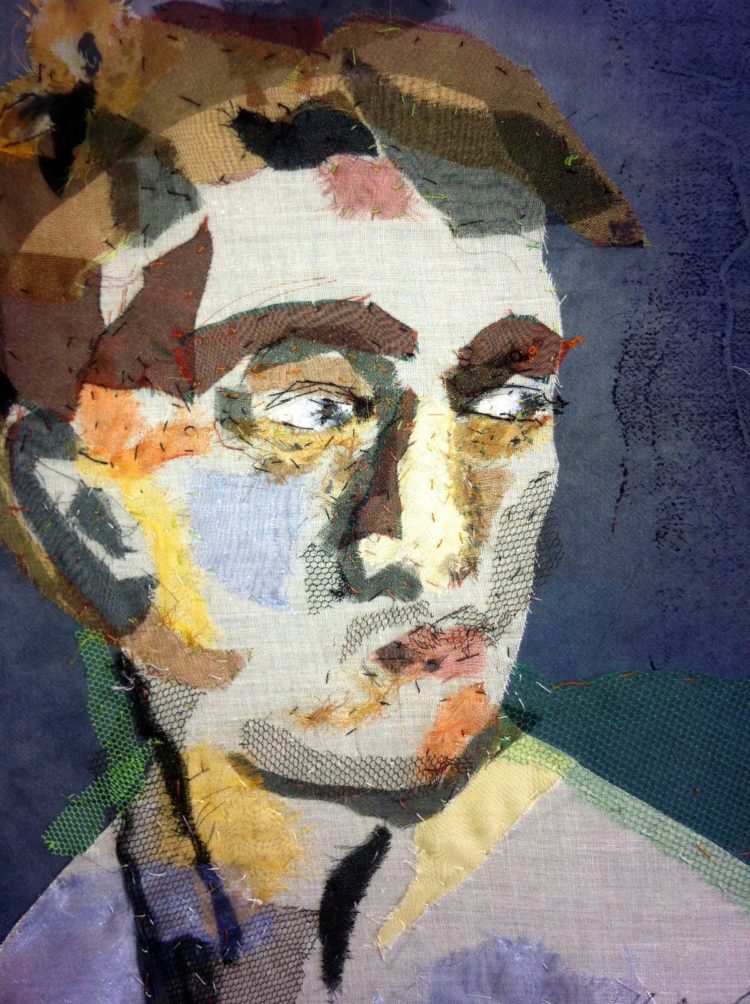
What advice would you give to an aspiring textile artist?
Trust yourself. Maybe it’s a cliché, but that doesn’t mean it’s not true. Try to block out thoughts of doubt, especially at the beginning of a new project.
Don’t be afraid to really go for it. Make time for your art. In my experience, it often takes a few attempts to get the artwork were you want it to go. Let the process take time and trust your creativity.
And work, work and then work some more!
For more information visit monicagallon.com
If you’ve been inspired by how Monica captures moments in time, let us know by leaving a comment
















Amazing!
Very inspiring for me, love her unique way of working, wondering how this would work by machine.
Beautiful and fresh…
Wonderful. Impressionism with fabric bits. Yes, would probably work well with machine stitch. But the intimacy of hand work renders these very intimate portraits beautifully. The use of old clothing and other human detritus are a huge part of the ethos, as well. Thank you, Monica
Thank you for sharing Monica and her work with us today. Judy @fancified.ca
Brilliant ! What a warm open and honest approach Monica takes when discussing her work .
Lovely work! Thanks for letting us enjoy it.
I am always amazed by the originality of fellow textile makers so creative and the people so pensive.
Wondering how you display your pieces? Are theyfastened to a hard surface ?
Thank you! I hope Monica writes a book soon.
Mm very intresting. Technics for using fabrics in art might even be more challenging then painting, however not as apriciated.
Monica Gallon’s textile arts work is so moving. The sensitivity in observation and her response, the delicacy of her applique, choice of fabric, texture and colour are inspiring and beautiful to see. Her drawing and stitch are so astute and balanced and I am touched and moved by her work just seeing it on the computer screen. Would love to see it in reality and have time with it. Her integrity as she talks of her own development and drive are affirming and admirable. It leaves me wanting more, and that is admirable too, thank you…..
I started at a very young age. Wanting to sew, draw and touch the glories of fabric. My mom always made a sock doll to cuddle up to when I’d be sick. Loved your story. Warm blessings as you sew. Janice Shaffer
Absolutely fabulous! I love this Artist. Thank you